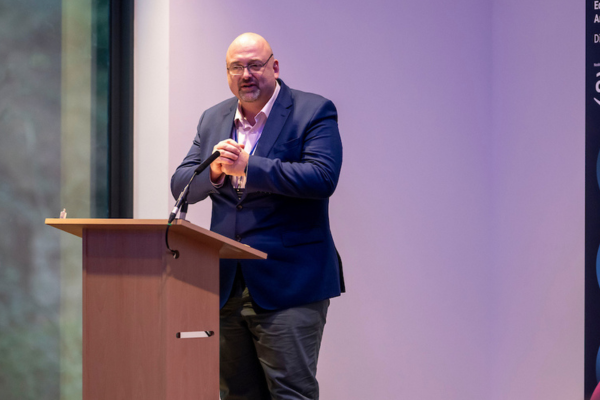Any good news story needs to include the who, what, why, where and when in question.
As Chair of the Artificial Intelligence (AI) Commission for Health and Social Care, I’m here to answer those questions on the Commission, and kick off our series of blogs setting out where we are, and where we’re going with AI in health and social care in Wales.

When
In January 2023, when I came into post as Chief Digital and Innovation Officer for Health and Social Care at Welsh Government (with a joint role as Chief Digital Officer for NHS Wales), the question I was asked most was ‘What is AI and what should we be doing about it?’.
My view was that AI could be a game-changer for our health and social care system, but we needed to gain a better understanding of its possibilities and ensure people can trust it when we put it to use. That’s still my view and, in October 2023, I was pleased to help launch the AI Commission for Health and Social Care, to achieve just that.
Who
Collaboration is expressly written into the Commission's vision and mission. It was formed to bring together all the right people from health and social care, life sciences, government and academia, to act as a guiding hand for the safe, ethical adoption of AI. We’re leveraging expertise from across the full spectrum of the sector, as well as bringing independent experts and voices from beyond Wales, to learn from the experiences of others.
What (will we be doing)
The Commission will be delivering clear guidance, standards and advice on best practice on the use of AI in health and social care.
Our key priorities are mapping the current ecosystem, identifying opportunities for AI-enabled services and interventions, and enabling safe, responsible and ethical AI.
In practice, this means having multi-disciplinary working groups focusing on areas including diagnostics, regulation and standards. We’re identifying best practice within Wales and beyond, considering how we can encourage these approaches going forward. We’ve already been evaluating relevant standards and guidance produced in other parts of the UK, to identify where we should implement these in Wales.
Where
It’s important we’re able to take a focused approach to how innovation applies to Wales in particular. As a nation, we do have some challenges in the large-scale adoption of AI in some fields.
Chiefly, our digital infrastructure needs to be strengthened. Common standards and more cloud-based infrastructure for health will be essential if we want to be able to quickly scale solutions.
Secondly, we’re a small nation, with relatively small datasets, albeit we’re making huge strides in this area. We’re very lucky to have the SAIL databank based at Swansea University and our National Data Resource will be another key step forwards. But, I often say that better data equals better care, equals better lives. This is more true than anywhere when it comes to training AI models, so we’re also going to need to work with large datasets, and with big academic institutions both in Wales and other parts of the UK.
Finally, we’re going to need a cultural shift to make the most of opportunities for innovation. We can be more ambitious and more innovative in Wales. The only thing currently holding us back is ourselves, and I hope the Commission will help bring confidence that we can be highly innovative in a highly responsible way in Wales.
Why
As always, the ‘Why?’ is where things get really interesting.
To date, many of us have built our image of AI from popular culture. Sci-fi movies depict AI as a technology intent on taking over the world, so it’s understandable that people are cautious.
But the emerging use cases for AI in health and social care are hugely exciting and show great promise for bringing positive change.
The ability for AI to complete basic administrative tasks, freeing up staff time. The potential for AI image analysis to allow for faster diagnosis of cancerous tumours.
And yet more advanced areas, like the work Genomics Partnership Wales is doing to map genomes for personalised cancer treatment plans. Faster, more complex analysis through the use of AI could be the key to fast-tracking developments like these.
Of course, there are big ethical challenges to consider.
Some of the early concerns around AI stemmed from models being trained on very limited datasets. Thankfully, diversity of training data is an issue we’re much more alert to now, but it’s still a risk factor. Similarly, we know lack of diversity in the tech industry – including those responsible for developing AI tools – is an issue. That’s something we’ll be considering at the AI Commission and, for our own part, we’re focused on including a multitude of different backgrounds in the conversation.
Moving on from the development of tools, other ethical concerns include how we train people to use AI. Like using a satnav, AI should never be followed blindly and we’ll need appropriate checks and balances. We’ll also need to consider whether AI has the potential to encourage us to intervene too early in a patient’s treatment journey and how this might affect people’s lives.
These are big, important questions, and the Commission’s broad membership has a crucial role in casting a critical eye over ideas and challenging ways of thinking.
I have a real passion for how technology, science and data can transform and modernize public services for the benefit of people and communities. AI presents huge opportunities in that regard.
Different use cases will need appropriate guardrails. The protocols for using AI to transfer financial data will be different to those needed for using AI in clinical decisions. Whatever the use, we’re here to fan the flames of innovation, while demonstrating how we can do that in a controlled and safe way.
Find out more about the AI Commission for Health and Social Care.



